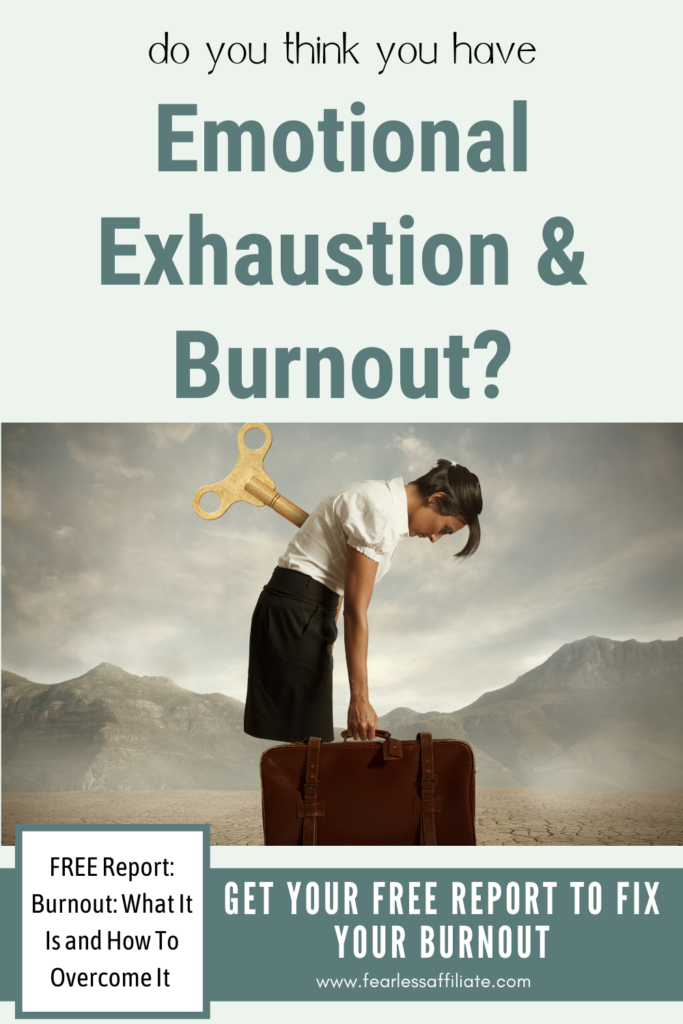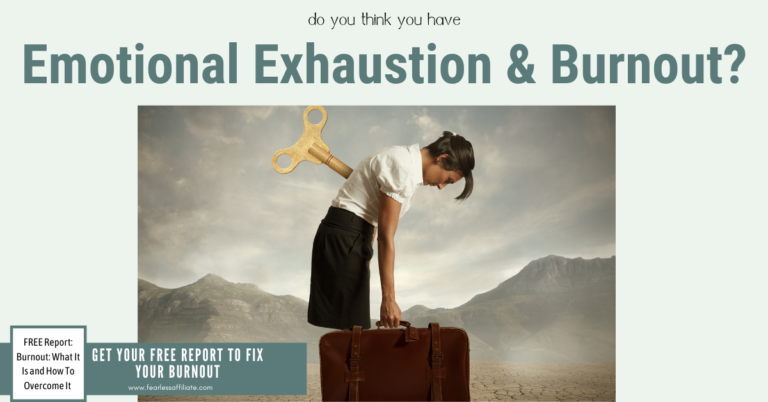What is emotional exhaustion burnout? And why do so many people have it these days?
Have you ever thought “I just want the world to go away and leave me alone!”? You may be in the early stages of exhaustion, so it is time to take care of it before burnout overtakes you.
Today we explore what happens in our lives when we let emotional exhaustion go on for too long.
Welcome to Fearless Affiliate.
My name is Irma and I help new bloggers to learn the ropes. There is a lot to take in that first year of blogging, from choosing a niche to changing your mindset from worker bee mentality to that of successful entrepreneur.
I like to focus on practical information and positive thinking. If that sounds good to you please sign up for my weekly newsletter of tips and exclusive content for subscribers.
Right now, get this FREE report on BURNOUT: WHAT IT IS AND HOW TO OVERCOME IT to help you understand how you can make your life easier.
This post may contain affiliate links. If you click a link and make a purchase, I may receive a commission at no extra cost to you. My opinions are my own and are based on my life experience. I am not a doctor nor do I claim to know the best options for you. If you need mental health help, please seek out professional help from a qualified practitioner.
Thank you for supporting my business! Full disclosure is here.
What is Emotional Exhaustion Burnout?

Mary was at the point in her worklife that she dreaded going in to work each day.
Her employer kept adding to her workload, but would not give her help to do the work, so she had not choice but to work faster to get it done on time.
This, coupled with staff shortages, meant that more and more of these “one man” projects became hers and she had to stay late to get things done.
Meanwhile, her supervisor walked out the door early, every single day. It was unfair.
Mary left work each day regretting her choice to work for that company.
She could not focus on her own life, because her mind was consumed by all the work that she had to do at her job.
The idea of quitting was so exciting, but Mary was afraid to take that first step. Life became very limited, and Mary knew it.
“I might as well get a shopping cart and live on the streets” Mary thought.
Dinners were packaged food or drive-thru. Evenings were spent in front of the TV. Headaches are frequent. Aches and pain came more often.
Gone were the days of going for a walk and never mind an early morning yoga class.
Mary did not have the physical or mental energy to take care of her own needs.
In this scenario, which is playing out all over North America right now, we see a person who has been pushed past their own emotional limits and into burnout.
Many people start working at a great company with an excellent reputation, only to quit in frustration.
Cutbacks, workload issues, constant restructuring of the business all take their tole on employees. Let’s look at some of the signs.
Related Post: 10 Shocking Signs You’re Burned Out From Work
The Signs of Emotional Exhaustion
Emotional exhaustion is a type of mental fatigue that can affect many areas of your life.
Not only does exhaustion of this magnitude affect you emotionally and mentally, but physically as well.
It makes it hard to focus and concentrate, hard to spend time with others, hard to do just about anything. See if you recognize any from your own life.
You Have Trouble Focusing
Do you find that your ability to focus and concentrate on a task is getting worse?
Maybe you can focus for a little bit, but not nearly as long as you used to.
This might be a sign of emotional exhaustion.
Having trouble focusing can come in many forms, so it’s not always as straightforward as not being able to get anything done.
You might find that you can focus for a few minutes at a time, but then your mind starts wandering.
You may be able to get your work done, but when it comes to anything around the house, you aren’t able to get anything done.
If you are taking classes, you might doze off constantly when trying to study or do homework.
Regardless of how it is happening, this could be a sign of emotional exhaustion.
You Are in a Constant State of Irritation
Being irritated and annoyed is a normal human emotion.
But you can probably tell when it gets worse or when it never seems to go away.
When it is from exhaustion or burnout, that irritation tends to be a constant state of moodiness.
Every little thing bugs you, whether it is from your spouse, your kids, your pets, co-workers, friends, or neighbors.
You never really feel settled and relaxed, and you can’t let anything go without it bothering you deeply.
It is often a more severe form of just being very touchy.

You Have Regular Aches and Pains, Headaches, and Other Pains
Believe it or not, mental and emotional issues can develop into physical aches and pains.
This is why when you are experiencing mental stress, you start experiencing physical issues, like:
- Not being able to sleep
- Neck pain from tension
- Headaches from the neck pain
- Overall body aches and pains.
The same thing can happen when you are struggling with emotional exhaustion.
It tends to create a lot of tension and pain in your physical body.
If you have aches and pains and no idea what is causing it, consider emotional reasons.
You Can’t Handle Any Amount of Stress
Everyone will go through stress on a regular basis, though the amount of stress you experience varies quite a bit.
When we were hunter/gatherers, our stress came from being chased by predators or trying to climb a mountain to get food.
Now our stress comes from work deadlines, traffic, lack of money, and pressure from others.
However, how you handle that stress is what can determine is a healthy emotional wellbeing, or dealing with emotional exhaustion.
You probably know the difference between normal stress that is uncomfortable, but you can deal with, and stress while you have emotional exhaustion.
Even if the situation causing your stress is similar, it seems so much worse.
It is an instant reaction of your mind and body, where you absolutely cannot handle any of it.
You Have a Lack of Motivation
In addition to not focusing or concentrating very well, you may also notice that you don’t have much motivation either.
You might be able to do what is mandatory, like going to work every day, but your efforts are minimal and you typically can only do the bare minimum.
Suddenly, you may have no motivation to exercise, run errands, or do self-care.

In fact, you may have no desire to do anything that isn’t working or sleeping, and possibly taking care of some of your more essential needs.
Nothing else sounds interesting at all to you.
Either that, or you feel so physically exhausted, you just can’t manage it at all.
You Cancel Most Plans
Canceling plans every once in a while might not be a big sign of exhaustion or burnout, but canceling every plan or even most of them can definitely be a warning sign.
A big sign of this is when you have weekly commitments with friends, such as Sunday brunch or going to the movies every Friday with your significant other, and you suddenly don’t want to go and keep canceling.
Any time something seems unusual for you, it could be a sign of exhaustion, burnout, or another emotional issue you are dealing with.
Emotional Exhaustion & Burnout are signs of not enough self care
If any of this seems familiar to you, then I want you to consider adding some self-care activities into your life, and letting other things go.
It is important to have balance in our lives, specifically to keep exhaustion at bay.
When we are calm, we can see and think more clearly about our lives and what we want.
If you try to make changes, such as switching jobs, and you are under a lot of mental stress, you can end up “out of the frying pan and into the fire” as they say.
We make decisions based not on what we really want, but on what we are trying to escape from.
In fact, the more self-care we do and the more centered we become, the easier it is to see what we should be doing for work.
Not just working for a paycheck, but work that benefits our mental health.

Types of Emotional Self-Care Activities
When it comes to self-care, most of the activities you probably have in mind help more with your physical body.
These might include:
- Taking a bubble bath
- Getting a massage
- Doing a face mask
- Any other form of pampering for your body.
But there are so many ways to practice self-care more for your mind and emotional health.
You may think that these types of activities are “woo woo”, but once you create the habit of prioritizing your mental health, you will feel much better about it.
Protect Your Energy
[click_to_tweet tweet=”One of the most important things you can do for yourself when it comes to emotional self-care is protecting your energy.” quote=”One of the most important things you can do for yourself when it comes to emotional self-care is protecting your energy.” theme=”style2″]
Consider the people who are around you on a regular basis, and how you feel during and after spending time with them.
If you discover friends or colleagues that make you feel exhausted, like your energy has been depleted just from a conversation with them, they are likely energy vampires.
These are toxic people who will take all your positive energy and leave you feeling emotionally drained.
Now is a good time to start spending a little less time with these types of people.
Seek out people who are doing what you want to be doing.
For example, if you have thought about having an online business, look for someone who has the type of business you want.
Maybe they have a website about homesteading, which always sounded ideal to you.
Go read up on it, see what they talk about, and if they have information on how you can get started.
Even if you never do it, at least you checked it out.
Ground Yourself aka Earthing

Grounding is a wonderful practice that not only helps you feel more connected to the Earth, but also more connected to yourself.
Direct physical contact with the electrons on the surface of the earth promotes physiological changes and reports of well-being that include better sleep and reduced pain, just from walking barefoot or sitting, working or sleeping outside.
This topic is well researched. Read more at the NIH/PubMed Central.
The simplest way for grounding is to go outside and put your bare feet in the natural earth’s surface.
Standing on dirt, grass, or sand outside is really healing and soothing.
You will notice the effects almost instantly if you are mindful during this process.
- It can be done at a park, forest, while hiking or going for a walk.
- Anther option is to put your bare feet in sand, such as at the beach.
- You might also want to go into water, like the ocean, lake, or river.
Even being in your own shower can be really grounding and soothing for your mind.
While you are outside, try to find a quiet spot and just listen to nature. Hear the birds, the wind blowing through trees, or dry leaves skittering across the ground.
Humans are designed to be outside, working the land or searching for food. Being in nature connects us to who we are deep inside.
Some other grounding options include:
- Drawing
- Reading
- Listening to music
- Any mindful activity that helps you feel centered.
Use a Journal for Self-Reflection
A very simple self-care practice for your emotional and mental wellbeing is to write in a journal.
There are many ways to journal, and they are all beneficial for you.
But for emotional self-care specifically, self-reflection and clarity is really important.
Journaling for self-reflection is when you journal your thoughts, feelings, and emotions.
Really dig deep to consider:
- How you feel at any given time
- What your primary thoughts are
- Any challenges you are dealing with
- If your moods and emotions are shifting.

journaling
The more honest you are during this process, the more self-reflection and self-awareness you will discover.
If you are angry about some new task you were given at work or the lines of people at the store checkout, then write out how you feel and why it makes you angry.
This is very therapuedic and helps you to see how some activities are more stressful than others.
After, you may decide to shop at a different time.
Or maybe do some journaling before work, so you can calmly accept new tasks, even if you do not agree with having to do them.
Allow Yourself to Rest
Something as simple as taking a little 20-minute nap in the afternoon when you’re tired or going to sleep earlier can be considered self-care.
‘The best bridge between despair and hope is a good night’s sleep.” – E. Joseph Cossman”

Your body and your mind both need rest.
If you get burned out by working too much or simply don’t allow yourself enough time for sleep, both your body and your mental state will react badly.
It can make emotional stress much more severe, and make it extremely difficult to improve your emotional wellbeing.
An easy way to start resting more is make a daily goal of allowing yourself just 15-20 minutes in the afternoon to do whatever makes you feel restful.
This can be a:
- Micro nap
- Sitting somewhere comfy to read a book
- Lounging on your patio
- Or even just sitting down to watch something uninterrupted.
Reduce Social Media Noise
Social media noise is any of the drama, distractions, and even triggers that are caused by what you see on social media.
It isn’t bad to want to use social media, but it can be easy to be negatively affected by it on an emotional level.
Some studies have shown that certain social media channels actively try to get “a rise out of you” because it keeps you engaged with the channel.
Don’t fall for that! Protect your mental health from negativity.
A good way to tell is just go 24 hours without using it, and write down how you feel when you’re done.
- Are you more relaxed?
- Did you have more time to focus on other things?
- Have you noticed the lack of being emotionally triggered helped you in some way?
If so, you know social media was a big part of your mental stress.
Conclusion
Emotional exhaustion and burnout are very real. It is a sign of the times we live in, where you are encouraged to go to college, only to graduate and find no jobs.
So you take what you can get. If school encouraged us to chase our dreams and passions, we would have many more happy people who are living their dreams.
“Find a job you enjoy doing, and you will never have to work a day in your life” – Mark Twain
If you think that now might be a good time to ditch your 9-to-5 job, consider starting your own online business.
Start now while you are still working and build it up so that you can quit your job.
Thanks to the pandemic, there has been a surge in new startups as people take charge of their income by creating it themselves. If online marketing interests you i.e. selling digital products online, then be sure to sign up for my 5 Minute Guide to Internet Marketing.
Please share with others…sharing is caring! Let me know in the comments if these tips work for you! Until next time, happy blogging and follow me on Pinterest!
-Irma 🙂
